Related Research Articles

Ulysses S. Grant was an American military officer and politician who served as the 18th president of the United States from 1869 to 1877. As commanding general, Grant led the Union Army to victory in the American Civil War in 1865 and briefly served as U.S. secretary of war. An effective civil rights executive, Grant signed a bill to create the Justice Department and worked with Radical Republicans to protect African Americans during Reconstruction.

Gettysburg is a borough in Pennsylvania and the county seat of Adams County, Pennsylvania, United States. As of the 2020 census, the borough had a population of 7,106 people.

The Richmond–Petersburg campaign was a series of battles around Petersburg, Virginia, fought from June 9, 1864, to March 25, 1865, during the American Civil War. Although it is more popularly known as the siege of Petersburg, it was not a classic military siege, in which a city is encircled with fortifications blocking all routes of ingress and egress, nor was it strictly limited to actions against Petersburg. The campaign consisted of nine months of trench warfare in which Union forces commanded by Lt. Gen. Ulysses S. Grant assaulted Petersburg unsuccessfully and then constructed trench lines that eventually extended over 30 miles (48 km) from the eastern outskirts of Richmond, Virginia, to around the eastern and southern outskirts of Petersburg. Petersburg was crucial to the supply of Confederate Gen. Robert E. Lee's army and the Confederate capital of Richmond. Numerous raids were conducted and battles fought in attempts to cut off the Richmond and Petersburg Railroad. Many of these battles caused the lengthening of the trench lines.

Frederick Augustus Conrad Muhlenberg was an American minister and politician who was the first Speaker of the United States House of Representatives and the first Dean of the United States House of Representatives. A member of the Federalist Party, he was delegate to the Pennsylvania state constitutional convention and a member of the U.S. House of Representatives from Pennsylvania and a Lutheran pastor by profession, Muhlenberg was born in Trappe, Pennsylvania. His home, known as The Speaker's House, is now a museum and is currently undergoing restoration to restore its appearance during Muhlenberg's occupancy.
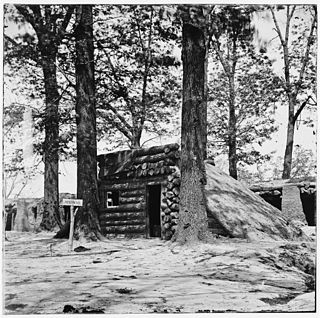
The Battle of Fort Stedman, also known as the Battle of Hare's Hill, was fought on March 25, 1865, during the final weeks of the American Civil War. The Union Army fortification in the siege lines around Petersburg, Virginia, was attacked in a pre-dawn Confederate assault by troops led by Maj. Gen. John B. Gordon. The attack was the last serious attempt by Confederate troops to break the Siege of Petersburg. After an initial success, Gordon's men were driven back by Union troops of the IX Corps commanded by Maj. Gen. John G. Parke.

The Army National Guard (ARNG), in conjunction with the Air National Guard, is an organized militia force and a federal military reserve force of the United States Army. They are simultaneously part of two different organizations: the ARNG of each state, most territories, and the District of Columbia, as well as the federal ARNG, as part of the National Guard as a whole. It is divided into subordinate units stationed in each state or insular area, responsible to their respective governors or other head-of-government.

The United States Revenue Cutter Service was established by an act of Congress on 4 August 1790 as the Revenue-Marine upon the recommendation of Secretary of the Treasury Alexander Hamilton to serve as an armed customs enforcement service. As time passed, the service gradually gained missions either voluntarily or by legislation, including those of a military nature. It was generally referred to as the Revenue-Marine until 31 July 1894, when it was officially renamed the Revenue Cutter Service. The Revenue Cutter Service operated under the authority of the U.S. Department of the Treasury. On 28 January 1915, the service was merged by an act of Congress with the United States Life-Saving Service to form the United States Coast Guard.

John Frederick Hartranft was an American military officer who read the death warrant to the individuals who were executed on July 7, 1865, for conspiring to assassinate American President Abraham Lincoln. Previously having achieved the rank of major general of the Union Army during the American Civil War, he had also been awarded the U.S. Medal of Honor for his actions in the First Battle of Bull Run.
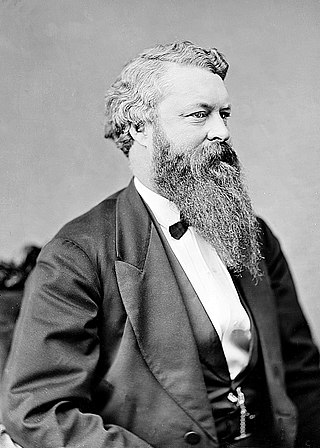
William Worth Belknap was a lawyer, Union Army officer, government administrator in Iowa, and the 30th United States Secretary of War, serving under President Ulysses S. Grant. Belknap was impeached on March 2, 1876, for his role in the trader post scandal but was acquitted by the Senate. Belknap was the first cabinet secretary in U.S. history to be impeached.
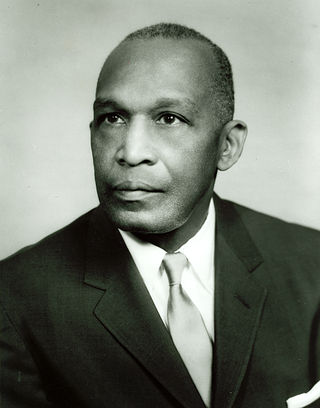
Robert Nelson Cornelius Nix Sr. was an American politician who served in the United States House of Representatives from 1958 until 1979. He was the first African American to represent Pennsylvania in the House of Representatives. The Robert N. C. Nix Federal Building in Philadelphia, Pennsylvania is named in his honor.
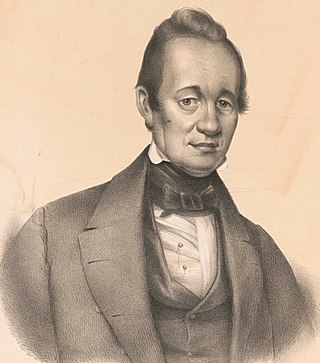
Henry Augustus Philip Muhlenberg was an American political leader and diplomat. He was a member of the Muhlenberg family political dynasty.

The Battle of Chaffin's Farm and New Market Heights, also known as Laurel Hill and combats at Forts Harrison, Johnson, and Gilmer, was fought in Virginia on September 29–30, 1864, as part of the siege of Petersburg in the American Civil War.

William Wallace Atterbury was a brigadier general in the United States Army during World War I, who began his career with the Pennsylvania Railroad (PRR) in 1886 and rose through the ranks to become its tenth president (1925–1935). As director-general of transportation in France during the war, the New Albany, Indiana, native and Yale University graduate was instrumental in reorganizing railroad traffic for more efficient transportation of troops and supplies for the American Expeditionary Forces. He was also known as "The Railroad General". Under his leadership after the war, the Pennsylvania Railroad undertook a $250 million project to electrify major portions of its main line that ran between New York City and Washington, D.C. He also assisted in development of the company's first M1-class steam locomotive.

The Valley campaigns of 1864 began as operations initiated by Union Lieutenant General Ulysses S. Grant and resulting battles that took place in the Shenandoah Valley of Virginia during the American Civil War from May to October 1864. Some military historians divide this period into three separate campaigns. This article considers them together, as the campaigns interacted and built upon one another.
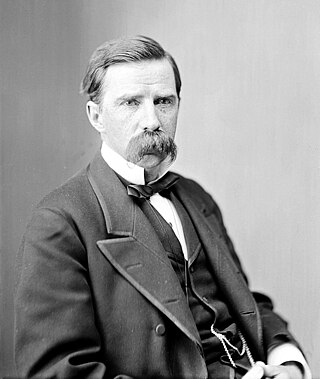
James Donald Cameron was an American banker, businessman and Republican politician who served as Secretary of War in the cabinet of President Ulysses S. Grant from 1876 to 1877 and represented Pennsylvania in the United States Senate from 1877 to 1897. Cameron succeeded his father, Simon Cameron, in both offices and as boss of the powerful Pennsylvania Republican political machine.

California's involvement in the American Civil War included sending gold east to support the war effort, recruiting volunteer combat units to replace regular U.S. Army units sent east, in the area west of the Rocky Mountains, maintaining and building numerous camps and fortifications, suppressing secessionist activity and securing the New Mexico Territory against the Confederacy. The State of California did not send its units east, but many citizens traveled east and joined the Union Army there, some of whom became famous.

Gotthilf Heinrich Ernst Muhlenberg was an American clergyman and botanist.
Edward Duchman Muhlenberg was an American civil engineer in the railroad industry and an officer in the Union Army during the American Civil War. He commanded an artillery brigade at the Battle of Gettysburg while only a lieutenant. He played an important role in the defense of Culp's Hill against attacking Confederates.

On the onset of the American Civil War in April 1861, Ulysses S. Grant was working as a clerk in his father's leather goods store in Galena, Illinois. When the war began, his military experience was needed, and congressman Elihu B. Washburne became his patron in political affairs and promotions in Illinois and nationwide.

Ulysses S. Grant was the 18th president of the United States (1869–1877) following his success as military commander in the American Civil War. Under Grant, the Union Army defeated the Confederate military and secession, the war ending with the surrender of Robert E. Lee's army at Appomattox Court House. As president, Grant led the Radical Republicans in their effort to eliminate vestiges of Confederate nationalism and slavery, protect African American citizenship, and pursued Reconstruction in the former Confederate states. In foreign policy, Grant sought to increase American trade and influence, while remaining at peace with the world. Although his Republican Party split in 1872 as reformers denounced him, Grant was easily reelected. During his second term the country's economy was devastated by the Panic of 1873, while investigations exposed corruption scandals in the administration. Although still below average, his reputation among scholars has significantly improved in recent years because of greater appreciation for his commitment to civil rights, moral courage in his prosecution of the Ku Klux Klan, and enforcement of voting rights.
References
- ↑ "Marie H. Bonekemper". The Morning Call. May 10, 2005. Retrieved April 26, 2015.
- ↑ "Edward H. Bonekemper III". Lancaster Online. December 17, 2017. Retrieved January 10, 2017.
- ↑ "Edward H. Bonekemper III" Lancaster Online.
- 1 2 Staff (June 22, 2009). "Reunion 2009: It's a Wrap!". The Talents Entrusted to our Care. Retrieved April 23, 2015.
- 1 2 3 4 5 6 Staff. "Edward Bonekemper". Conservative Book Club. Retrieved April 22, 2015.
- 1 2 3 4 5 6 7 "Edward H. Bonekmeper is a CWN Book Review Editor". Civil War News. Archived from the original on March 4, 2016. Retrieved April 23, 2015.
- 1 2 "Lincoln and Grant to be discussed at upcoming Civil War Round Table Meeting". Port City Daily. December 25, 2014. Retrieved April 23, 2015.
- 1 2 Blosser, Shannon (August 27, 2004). "General Grant defended in Raleigh". Carolina Journal Online. Retrieved April 22, 2015.
- 1 2 3 "Six Turning Points of the Civil War" (PDF). Civil War Round Table of Eastern Pennsylvania. Retrieved April 23, 2015.[ permanent dead link ]